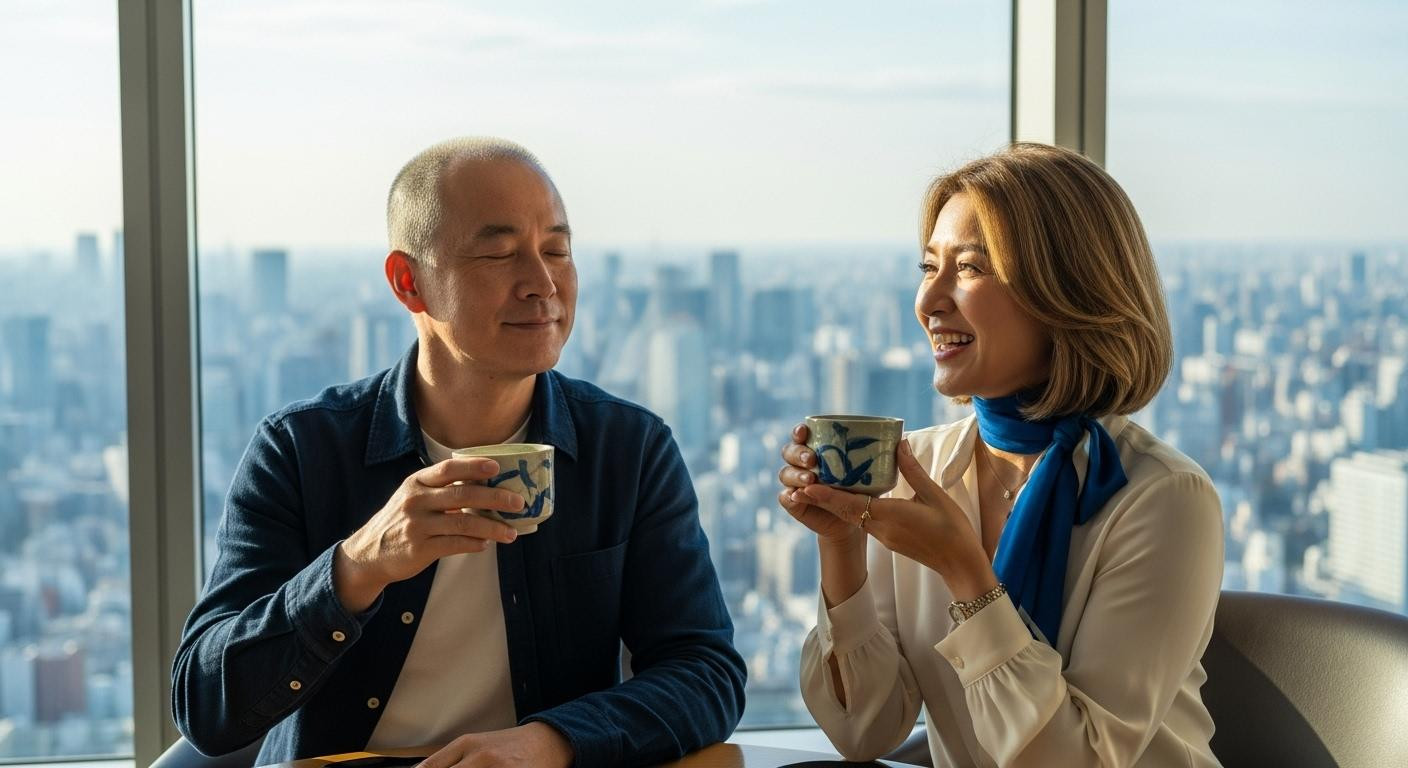Dawn breaks over Toranomon Hills at 6:47 AM. Soft light filters through floor-to-ceiling windows as a Tokyo couple celebrates their anniversary. They sip complimentary matcha at the 52nd-floor cocktail lounge while tourists queue for Mandarin Oriental breakfast buffets across the city. This isn’t where guidebooks direct the 30 million annual visitors. This is where Tokyo’s 13.8 million residents book their own celebrations.
While international travelers concentrate in predictable luxury chains, locals know different addresses. Boutique design hotels in Shibuya’s narrow streets, Harajuku’s creative districts, and emerging neighborhoods offer something major brands can’t replicate: authentic Tokyo hospitality philosophy wrapped in Japanese design sensibility.
Where Tokyo residents actually celebrate
Tourist accommodation patterns reveal stark divisions in Tokyo’s hotel landscape. International visitors book familiar names: Four Seasons Marunouchi ($500-600 per night), Mandarin Oriental Nihombashi ($450-550), Park Hyatt Shinjuku ($400-500). These properties serve 88% of foreign travelers seeking predictable luxury experiences.
Tokyo residents follow different logic when celebrating anniversaries, promotions, or milestone birthdays. They book properties designed by Japanese architects in neighborhoods tourists rarely explore. Trunk House’s 15 rooms in Shibuya attract local couples planning proposals. Andaz Tokyo’s nightly cocktail hour draws Roppongi residents seeking elevated experiences without tourist crowds.
The emotional calculation isn’t luxury versus budget. It’s authentic versus generic, connected versus isolated, Japanese hospitality philosophy versus international hotel standards.
The new Tokyo hotel philosophy
Tokyo’s boutique revolution emerged from uniquely Japanese design principles. Small-scale intimacy over grand lobbies. Neighborhood integration over isolated luxury compounds. Experiential details reflecting “omotenashi” hospitality traditions that international chains struggle to replicate authentically.
Design innovation that locals recognize
Trunk Hotel Cat Street occupies Harajuku’s creative epicenter. Designed as a “social hotel” merging fashion, sustainability, and community engagement, it features studio apartments showcasing Japanese minimalism with global design influences. The ground-floor restaurant hosts neighborhood gatherings, not just hotel guests.
Trunk House in Shibuya takes this concept further. Just 15 rooms occupy a renovated traditional building, each uniquely designed. Staying here feels like visiting a design-obsessed friend’s home rather than checking into a hotel.
Location philosophy: neighborhood over district
Andaz Tokyo’s Toranomon Hills placement exemplifies this approach. Rather than tourist-heavy Ginza, the hotel anchors Tokyo’s newest neighborhood transformation. This emerging business district maintains residential character with morning fish markets and local breakfast spots within walking distance. Locals appreciate proximity to authentic Tokyo rhythms.
What locals actually book
Tokyo residents’ hotel choices reveal priorities foreign visitors often miss. Authentic neighborhood immersion, design coherence reflecting Japanese aesthetic traditions, and experiential details showcasing hospitality culture that major chains can’t authentically execute.
The boutique hotel circuit
Andaz Tokyo Toranomon Hills ($310-390 per night) features 52nd-floor arrival experiences and nightly cocktail hours overlooking Tokyo Tower. Corner suites popular for proposals book 2-3 months ahead during cherry blossom season.
Trunk Hotel Cat Street ($220-330 per night) attracts Tokyo’s creative professionals. Fashion-forward design and community-focused spaces make it ideal for small celebrations and creative industry networking events.
Trunk House Shibuya ($330-440 per night) offers 15 exclusive rooms combining traditional architecture with contemporary design. Personal concierge service and months-ahead booking requirements reflect its popularity with locals celebrating special occasions.
The food and experience factor
Local-preferred hotels emphasize dining experiences reflecting Tokyo’s culinary depth. Andaz Tokyo’s restaurants source from Tsukiji Market daily. Trunk properties integrate neighborhood coffee culture, local bakeries, and craft cocktail programs using Japanese spirits like shochu and whisky.
These experiential touches matter more to residents than standardized amenities. They want hotels that feel connected to Tokyo’s evolving food scene rather than isolated from it.
Why locals skip the luxury chains
International luxury brands offer predictable excellence, but Tokyo residents seek deeper connections. Neighborhood character integration, design reflecting Japanese aesthetic philosophy, and scale allowing personalized service create experiences major chains can’t replicate.
A Mandarin Oriental suite costs $550-650 per night. Trunk House at $380 offers 15-room intimacy, personalized neighborhood recommendations, and design coherence feeling authentically Tokyo rather than generically international.
The calculation isn’t about luxury versus budget. It’s about authentic versus generic, connected versus isolated, Japanese hospitality philosophy versus standardized international hotel experiences that could exist anywhere.
Your questions about Tokyo hotels answered
How far ahead do locals book these boutique hotels?
Peak seasons (cherry blossom season March-April, autumn foliage October-November) require 2-3 months advance booking for properties like Trunk House and Andaz Tokyo corner suites. Shoulder seasons (January-February, June-July) offer easier availability with comparable rates. Tokyo residents typically book 6-8 weeks ahead for anniversary celebrations and milestone events.
What makes these hotels local favorites versus tourist traps?
Genuine local preference shows in repeat booking patterns, Japanese-language website emphasis, and neighborhood integration depth. Hotels locals actually use feature Japanese design elements, neighborhood-sourced amenities, and staff who live locally rather than international management transfers. They feel connected to Tokyo’s creative and culinary communities.
How do boutique Tokyo hotels compare to luxury chains for celebrations?
Boutique properties emphasize intimate scale (15-50 rooms versus 300-500), personalized service, and neighborhood character. Luxury chains offer predictable amenities, extensive facilities, and international standards. Budget overlap ranges $300-500 per night for both categories, but boutique hotels provide more personalized celebration planning and authentic Tokyo experiences.
Morning light touches Trunk House’s minimalist courtyard as a Tokyo couple checks out, already planning their next anniversary stay. This is Tokyo’s hotel secret: not the tallest towers or most famous names, but intimate spaces where design philosophy, neighborhood character, and Japanese hospitality traditions create celebrations tourists never discover.
